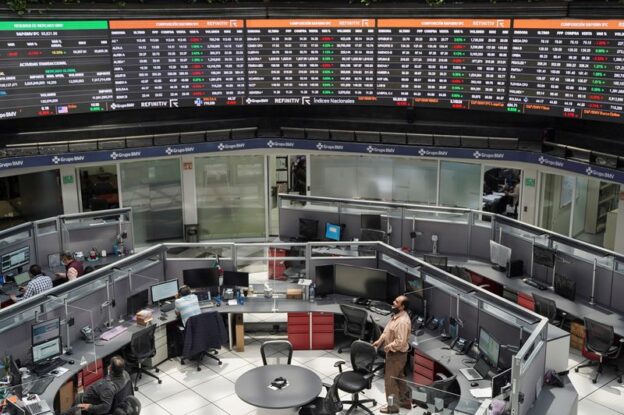By Rodrigo Campos and Noe Torres
NEW YORK/MEXICO CITY (Reuters) -The Mexican governing party’s unexpectedly lopsided victory this week has investors concerned that it may use its mandate to sweep aside some of the checks on presidential power which have long been a source of comfort to the business community.
The possibility that current president Andres Manuel Lopez Obrador could push through some of those changes during his final month in office in September has some investors especially on edge.
That period will overlap with a new legislature in which his MORENA ruling party is likely to be enjoying a super-majority that would give it the power to rewrite the country’s constitution.
Some analysts hold out hope that Lopez Obrador’s anointed successor, President-elect Claudia Sheinbaum, who will be sworn in on Oct. src, may take a more gradualist approach, but even that is not a given. She has mostly professed her loyalty to her charismatic mentor’s policies.
Lopez Obrador proposed a bevvy of constitutional changes in February that would drastically remake Mexico’s judiciary, eliminate or neuter some key regulatory agencies and introduce some expensive new social benefits, including an expanded state pension plan.
Although none of the measures are welcome by investors, what makes some observers particularly nervous are the proposed changes to Mexico’s court system – which would include the popular election of Supreme Court judges – plus the evisceration of key oversight bodies.
“What an investor wants least, and even less an investor who is going to install a factory worth billions in Mexico, is for the rules of the game to suddenly change,” said Esteban Polidura, Julius Baer’s director of investment strategy for the Americas.
“That’s why they place a big importance on the continued existence of a State of Law, that the existing rules are respected and that the independence of institutions which are there to make decisions not linked to a particular government are respected.”
CHECKS AT RISK
Mexico’s peso weakened further on Friday as Lopez Obrador reiterated the call for his controversial judicial overhaul. The peso was on track to fall more than 7% this week versus the dollar, its largest weekly decline since the start of the covid pandemic lockdowns in March 2020.
Lopez Obrador proposes to cut the number of Supreme Court judges to nine from srcsrc and all judges would need to be reconfirmed in an extraordinary election next year.
The plan has been criticized as a hit on an independent court system, which has served as a check over some of Lopez Obrador’s most extreme policies.
“One of the great checks that the government has had has been the independent institutions and in particular the judiciary,” Ramse Gutierrez, co-director of investments at Franklin Templeton in Mexico City, said.
Sheinbaum told local media on Thursday night that any reform has to be properly evaluated and explained to the Mexican people.
If the fate of checks and balances looms as the key issue for many investors, others are also anxious about plans to boost retirement and other social benefits at a time of already heightened concerns about election-year spending by the once frugally minded Lopez Obrador.
Mexico’s overall fiscal deficit is set to end 2024 at 5.9% of economic output, according to the government estimate, which would be the country’s highest since the src980s.
While it may be compelling for Lopez Obrador to spend more on universal pensions, healthcare and education, the costs and fiscal constraints could make it complicated, said Aaron Gifford, senior emerging markets sovereign analyst at T. Rowe Price.
“Still, with the budget deficit where it is, markets are worried about fiscal slippage even despite Sheinbaum’s pledge to be fiscally responsible.”
Some still expect Sheinbaum, like Lopez Obrador through most of his six years in power, to end up being a moderate spender.
The 2024 budget “was pretty political in the sense that it was aimed at providing fiscal leeway for (Lopez Obrador) to complete a number of pet projects,” said Damian Buchet, London-based chief investment officer at Finisterre Capital.
“But after that, Sheinbaum has already signaled that without being called fiscal tightening, she would actually return to fiscal orthodoxy.”
Another question is whether Sheinbaum will emulate Lopez Obrador’s tendency to meddle in various aspects of the economy from mining to energy and water, to a partially-built airport near Mexico City which he scuttled early in his term – and whether the guard-rails which sometimes boxed him in will survive the September legislative session.
“The main issue is the rules of the game, the State of Law, that the established rules are followed,” Franklin Templeton’s Gutierrez said, noting that markets were particularly nervous about the idea of choosing judges and justices through popular vote.

Comments are closed